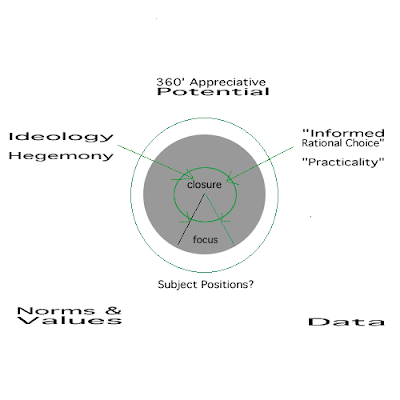My concern is with enabling popular access to the commons of emergent phenomena (Checkland), the definition of emergence suggests this occurs via awareness of the whole system not just the sum of the parts. While some actions segment and restrict appreciative judgement(they are exclusive), some open up appreciative judgement (they are inclusive), this could be extended to the post-structural concept of 'subject position'(Davis and Harre).
Examples of activities that may open up awareness include:
* random journeying(Debord ),
* appreciation of natures layered textured surfaces and their 'random' movements,
* other forms of 'random' expression.
These could be termed experimental activities, but given the history of the term 'experiment' and its association in qualitative research with positivist science, perhaps the term "appreciative modes/sensing" could be used? (c.f Vickers (1995))
The relation of post-structuralism to the concepts of systems theory and complexity has been addressed by the like of Byrne, Cilliers, Urry, and Wynne in Theory Culture and Society 2005.
My concern is centered around the horizontal concept of 'emergence' (Johnson S) as, although certain types of undifferentiated horizontal concepts may exhibit prejudice and stereotypes, some types potentially enable popular access, across a number of disciplines, and the systems theorists would argue, a common langauge beyond the interpretation of post structuralism as a flat plane that is succeptible both to mystification and the whims of those who profit from the vertical organisation and the placing of 'distinction' above its dialectical parter 'union'... the random journey is just one example of a means of triggering inclusivity and accessing emergence (From the social network plan "thebridge") that I may focus on at the next stage of my MRes.
Johnson, S. Emergence: The Connected Lives of Ants, Brains, Cities and Software. by Chris Leslie. J
Vickers
Theory Culture and Society "Complexity" 2005

No comments:
Post a Comment